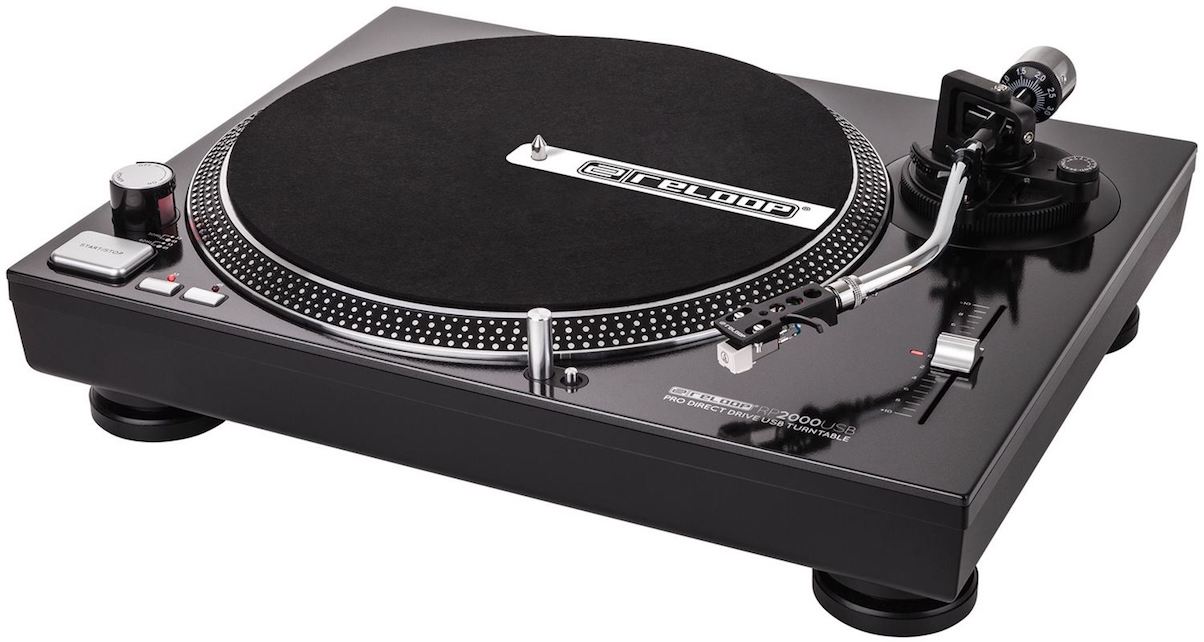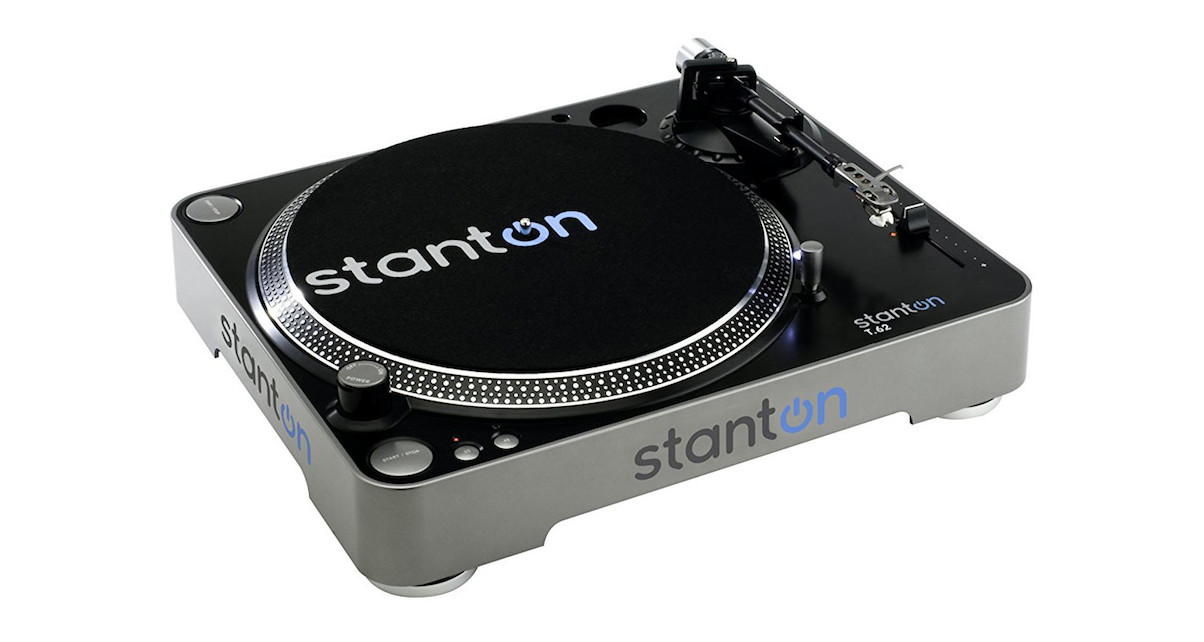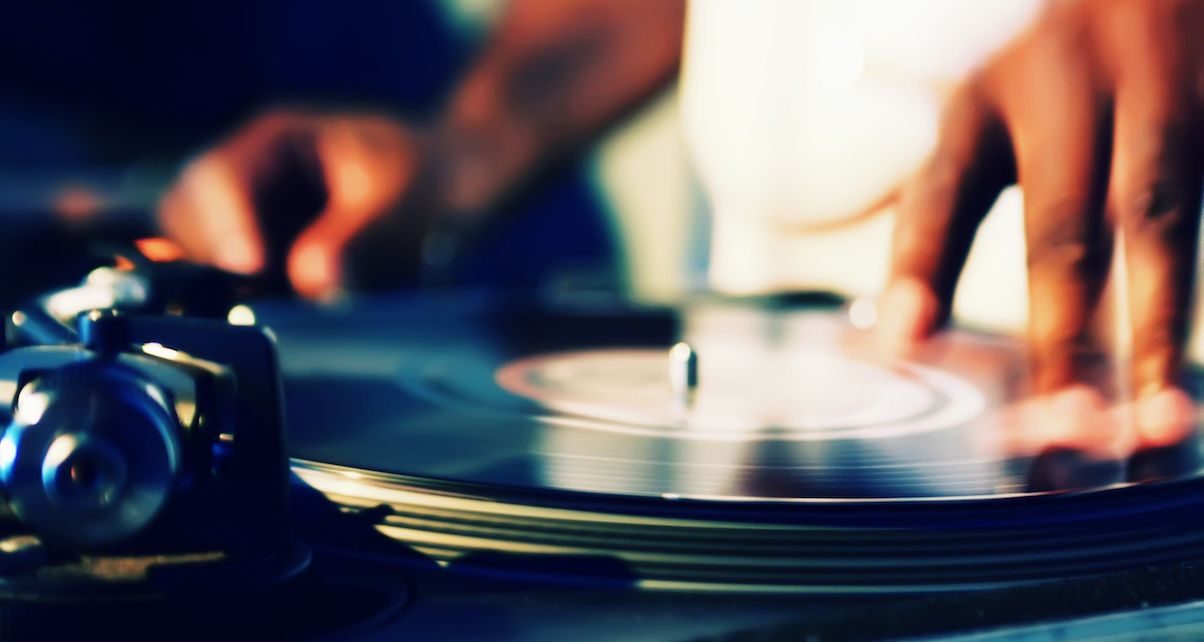
There are many reasons why you might want to invest in turntables. Perhaps you have found some old records and want to rip them to a digital format (in which case, you would only be looking for one), or are looking into setting yourself up with DVS, or want to dig out some old vinyl and get spinning again?
Whether you’re just starting out or you’re a returning experienced DJ, picking a pair of new turntables can be a difficult task. We don’t want you to shell out on something you don’t need (eg useless-for-DJing belt-drive decks). We want you to get the best bang for your buck.
In this roundup, we have listed our top five entry-level direct-drive DJ turntables for you to consider (in no particular order).
5 Budget decks
1. Audio Technica AT-LP120-USB

The Audio Technica AT-LP120-USB has been around for a good five years now and remains a popular choice for beginners wanting a solid deck with a familiar design. It has a decent motor and the added USB output makes ripping your old vinyls to MP3 a simpler task. If it’s the vinyl-ripping capability that you are mainly after, this deck wouldn’t look out of place alongside your lounge sound system as well. It also comes in black and grey, always nice to have a bit of choice.
Pros: Looks the part and has good sound and build quality, certainly suitable for semi-pro use. Comes with a lid (unhinged) to keep pesky dust at bay. It’s internally grounded, so there are less straggly wires around.
Cons: Not many, although there have been some reliability issues regarding the platter and anti-skate listed online.
Price: US$250
2. Reloop RP2000 M

The Reloop RP2000 M is a good option for home practice, with its design paying homage to Technics 1200s. It does, however, lack USB functionality for ripping. This is available for an extra US$100 on the “USB” version of this deck but there are cheaper ways to find a workaround than that. Its black metallic finish and heavy construction do give this deck a professional feel.
Unfortunately, it does let itself down in the torque department (as lots of entry-level decks do). This means that the platter easily slows down when touched and then takes a little too long to speed up when released. This will make it a little tricky to mix on but it’s worth remembering that some of the best ever DJs started on a lot less.
Pros: Nice design and does exactly what it says on the tin.
Cons: Torque isn’t great, meaning that the platter speeds up more slowly and a light touch on the platter is enough to stop it turning. Therefore, it lacks the feel of a pro turntable.
Price: US$299
3. Stanton T.62 M2

The T.62 M2 is a great choice if you’re looking to get into (or back into) DJing. It comes with everything you need to “plug and play” and has plenty of torque, a feature sure to please even the most experienced scratch DJs. The straight tonearm boasts better tracking for scratching too.
It has a solid build and is ideal for a budget home set-up or as a stop-gap before you can afford something more powerful. I borrowed a pair of these from a mate one Christmas when I was away from my decks and they served me well.
Pros: For what you get, this turntable is very cheap. The T.62 M2 is a powerful turntable and comes with a Stanton 300.v3 cartridge, so you can use it right out of the box.
Cons: At this price point, it is difficult to pick holes but the slipmat that comes with the deck is pretty poor and will need replacing from the off.
Price: US$159
4. Pioneer DJ PLX-500

As far as entry-level turntables go, the Pioneer PLX-500 is in the mid-high price range. It inherits the layout of the Pioneer PLX-1000 professional turntable but without any bells and whistles, coming in at a little less than half the price. Even so, I would have expected a more powerful motor inside. Everything is laid out as you would expect it to be and it comes with USB functionality for the easy ripping of vinyl.
The PLX-500 feels solid for a deck with an all-plastic enclosure, and the sound quality is decent. This is down to the way it has been damped with sound deadening materials. This means it’s heavy as well, which gives it a more professional feel than some of the other turntables on this list.
Pros: As can be expected from Pioneer DJ gear, this is a solid turntable, suitable for use at home or in a small bar set-up.
Cons: From experience of playing out on this deck, the platter can slow easily with even light pressure. This takes some getting used to but isn’t the end of the world.
Price: US$349
5. Numark TT250 USB

The Numark TT250 USB is a traditional looking turntable with a die-cast aluminium platter and an extended pitch slider (+/-10%). It looks the part but it is certainly more suited to home use. This is mainly because it lacks the torque of more expensive decks. It is also quite lightweight, and for this reason is only a good option for home practice and for using its USB out to digitise your vinyl collection.
(Numark recently announced the NTX-1000, which looks to be a beefed up version of the TT250, capable of even challenging some of the more professional models. One to keep an eye out for and we look forward to reviewing it in the future.)
Pros: A decent deck for a home practice set-up or for ripping vinyl. Can be used straight out of the box and the included hinged dust cover is always welcome.
Cons: Low torque and the supplied cartridge will need replacing as it is flimsy. This turntable is not very well constructed, ruling out advanced scratching or professional club use.
Our full review: Review & Video: Numark TT250 USB
Price: US$249
What about used turntables?

If you have managed to save up a bit of cash and are looking to pull the trigger on a pair of turntables but are worried about how long they will last for, look no further than the Technics SL 1200 range. Technics are found in club booths worldwide for a reason. These decks were built to last and are commonly found on sites like eBay and Craigslist. However, how can you be sure that they are in full working condition and that you aren’t going to be ripped off?
I had exactly the same fear when I bought mine. I saved and did a bit of research and understood that I had two choices. The first was to buy a set of turntables, hope for the best and then have them fixed if anything was awry. The second, to spend a little extra and buy a set of Technics from an experienced refurbisher. I plumped for the second option because they came with a six-month guarantee, should anything go wrong. I have had mine for four years now and they have travelled to Russia and back twice on a plane and still work perfectly fine.
Finally…
It can be difficult to tell entry-level DJ turntables apart from each other as most of them look similar. Overall, they pretty much offer the same features too, USB functionality being the main addition over the past few years. The key things to be aware of when picking your turntables are their torque and sound isolation properties. These are the only things that drastically improve as you move up into the professional turntables bracket.
That is not to say, however, that you can’t find quality turntables for a low price; you just have to bear in mind that your decks will most likely need replacing quicker and will not be suitable for professional use (ie in a loud club). This is especially true if you are going to be moving your decks around to gigs and back. If you have saved up and can hold out for an extra couple of months to get a set of “pro” level turntables, that would be most ideal. As they say, “cheapest is dearest”…
Which other DJ turntables do you think should be on this list? Are you looking to buy a set of turntables? Which turntables do you own? Do you agree with Technics being the best second-hand option? Let us know in the comments below…







![How To DJ Warm Up Sets [Live DJing Q&A With Phil Morse] How To DJ Warm Up Sets [Live DJing Q&A With Phil Morse]](https://cdn.digitaldjtips.com/app/uploads/2023/06/10150042/546463301-warmpup-blank-website.jpg)
![Modular DJ Gear, Best Production DAW, Keeping Crowds Interested [Live Q&A] Modular DJ Gear, Best Production DAW, Keeping Crowds Interested [Live Q&A]](https://cdn.digitaldjtips.com/app/uploads/2024/03/07184219/7march-WEBSITE-150x150.jpg)